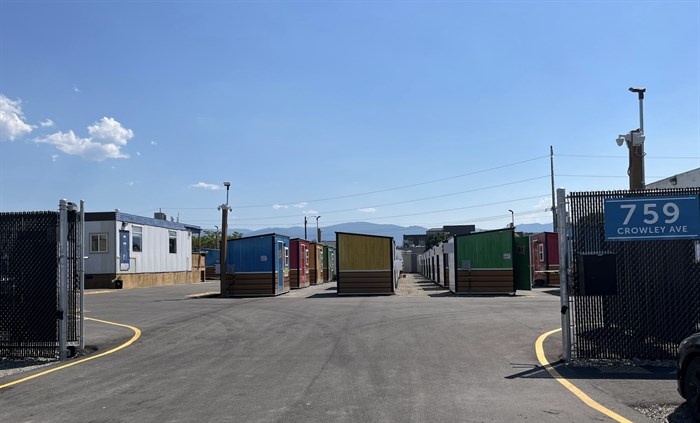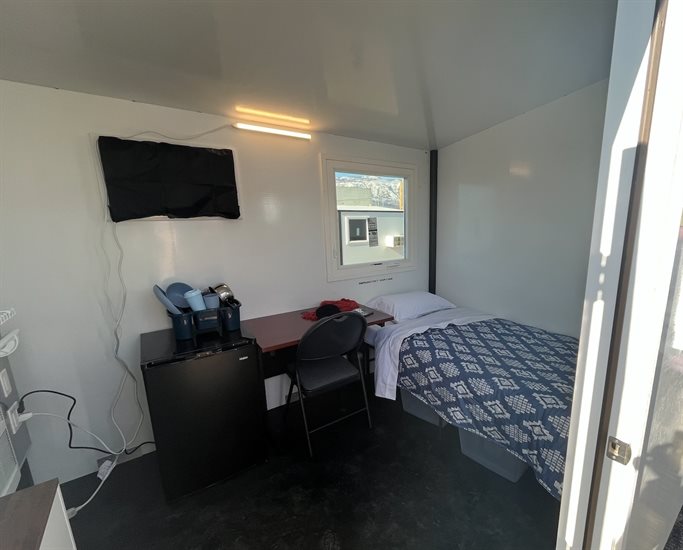How Kelowna’s tiny home community is faring six months in
Kelowna recently established a new project to help homeless people get on their feet, and the project’s lead said while it has been a success so far, there's still a lot to learn.
BC Housing and the HEARTH Program collaborated with the John Howard Society to build 60 tiny houses in Kelowna dubbed STEP Place.
The John Howard Society runs the community program on Crowley Avenue in Kelowna. STEP Place isn’t just a shelter or a few rows of sheds for people, it’s a system that helps connect people with programs that are customized for their needs.
The little homes have been occupied since the beginning of March, and John Howard Society’s chief executive officer Patricia Bacon is happy with how it’s going.
“The little short stay units are working fine. People might be wondering if the air conditioning is working or if they're staying cool enough and they are, so we’re really happy about that,” Bacon said. “We have clients that are participating in programs that are helping them think about their housing goals.”
The program is geared towards people who want to learn new skills and strive to find open market housing, she said, adding there's a thorough screening process, often of people who are already in shelters to find those best suited to seize the opportunities presented to them at STEP Place.
READ MORE: Tiny homes for Kelowna's homeless community welcomes first residents
“There's an expectation that people come in with that understanding. Maybe they don't have that understanding when they first come in, but we certainly work with participants to help them understand that that's what they're signing up for,” she said.
Residents who decline to participate in any of the programming could lose their spot in the community, but each person’s programming is catered to their individual needs.
“One of the programs that we have is a program called Lunch Masters. It's a really great program that helps our clients understand how to cook nutritious meals on a budget,” she said. “We have some clients who already are really great cooks, like they could teach the class. So we're not going to say to that person, ‘you've got to take a Lunch Masters program.’”
The community screens residents for substance use issues and mental illness when they move in. There is an overdose prevention site in the community where drug users are supervised so people don’t use drugs in their units. Residents are not allowed to have drugs, or smoke cigarettes or cannabis in their units.
Bacon said they don’t search people or their homes, but they do wellness checks consistently so she feels there is no need for searches.
“Wellness checks are something that are just par for the course with any kind of supportive housing, supportive transitional housing or any kind of therapeutic housing,” she said. “If somebody's using in their short stay unit, we would know pretty quickly.”
READ MORE: Non-profit makes effort to fill impending homeless day space gap in Kamloops
The program is new so the monthly operational costs are still being calculated and the society is following up with residents who moved on from the program to see how effective it was at helping people adjust to open market housing.
“We’re still learning,” she said. “I’m not comfortable giving an estimate on costs right now because I don’t think it would be accurate.”
She said a major component of the program’s potential is the fact that residents have control over their space.
“Having your own four walls where you can close the door and listen to music and hang out, is tremendously empowering for many people that they maybe haven’t ever had that in their lives,” she said. “There's a shared community kitchen and there's programming that allows you to connect with other people. You're not isolated, it allows you to develop your skills and visualize a future for yourself.”
She said tiny homes would not work without the programming, support and rules that are in place.
“We all have rules. There's rules to being a person in a community where other people live and exist,” she said. “Every single one of us has a right to be treated with dignity, to be treated with some respect and to have our rights respected. Talk to someone in a condo building, or in a strata, there are rules anywhere you live.”
Click here for contacts regarding the waitlist for the next available spot at STEP Place.
To contact a reporter for this story, email Jesse Tomas or call 250-488-3065 or email the editor. You can also submit photos, videos or news tips to the newsroom and be entered to win a monthly prize draw.
We welcome your comments and opinions on our stories but play nice. We won't censor or delete comments unless they contain off-topic statements or links, unnecessary vulgarity, false facts, spam or obviously fake profiles. If you have any concerns about what you see in comments, email the editor in the link above. SUBSCRIBE to our awesome newsletter here.





